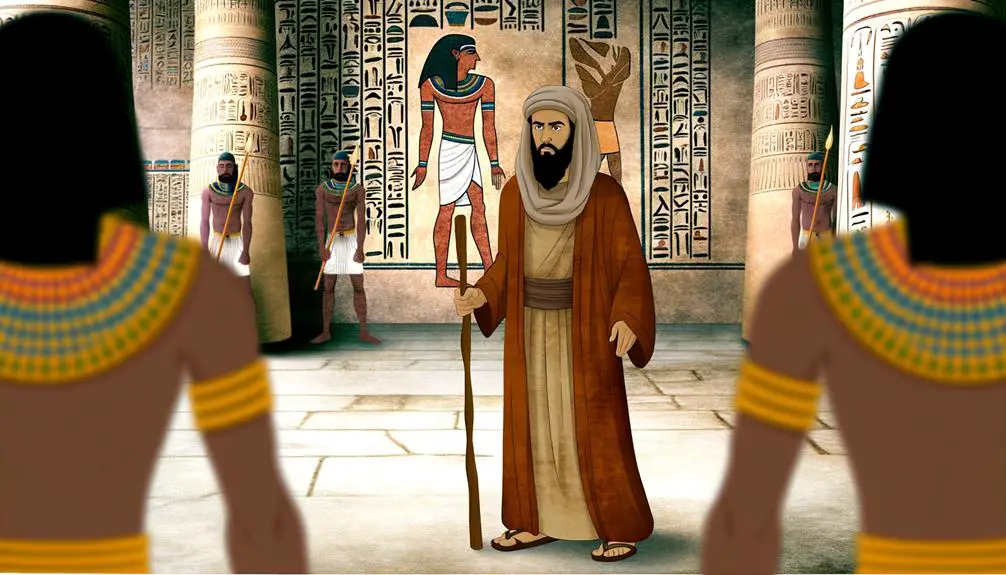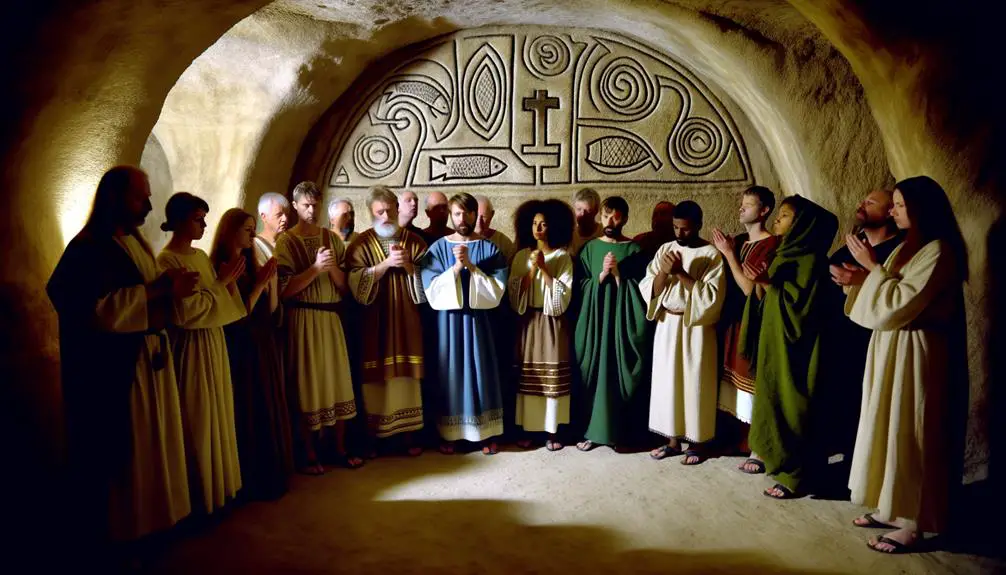Know biblical courage through stories of faith and action; discover how David and Esther's bravery can inspire your own spiritual journey.

Define Courageous in the Bible
In the Bible, courageousness isn't just about bold action; it's about maintaining a resilient faith and right action in the face of fear. You'll see this clearly in characters like David, who approached Goliath not with force, but armed with profound trust in God. Similarly, Esther showcased bravery by standing against potential genocide, guided by her devotion to justice and righteousness. These figures teach us that true biblical courage combines unwavering faith with the relentless pursuit of righteous action. Exploring their stories further, you'll uncover deeper insights into how courage can shape your own path.
Key Takeaways
- Biblical courage involves acting righteously and faithfully, even in the presence of fear.
- It reflects a steadfast commitment to God's commands and guidance.
- Courageous individuals in the Bible often faced significant risks to uphold divine principles.
- Examples include David facing Goliath, Esther advocating for her people, and Paul's missionary endeavors.
- True biblical courage is marked by persistent faith and moral integrity, despite external challenges.
The Essence of Biblical Courage

Often, biblical courage isn't about the absence of fear, but rather the resolve to act righteously despite it. You'll find that the Scriptures place a significant emphasis on this notion, intertwining the concepts of heroic perseverance and resilient faithfulness. Biblical courage, then, is not merely a moment of bravery but a sustained commitment to walking in God's way, no matter the challenges or threats that may come.
This kind of courage is manifest in numerous biblical figures who, despite their human frailties and the immense pressures of their circumstances, chose to remain steadfast in their faith. These individuals didn't rely solely on their strength but were empowered by their trust in God. Resilient faithfulness wasn't just about sticking to their beliefs but was also about actively living out those beliefs in every aspect of life, often in the face of overwhelming opposition.
Heroic perseverance, under these circumstances, goes beyond enduring; it's about persisting with purpose and dignity, guided by divine principles. It's a proactive stance, where you're not only surviving the storm but also using your faith to navigate through it, transforming challenges into opportunities for spiritual growth and deeper reliance on divine guidance.
Courage in the Life of David
As you reflect on the life of David, consider how his confrontation with Goliath showcases not just physical bravery but a profound trust in God's power. His leadership in adversity, particularly during times of national crisis and personal betrayal, illuminates the strength found in faithful perseverance. Additionally, David's ability to prioritize faith over fear, even in the shadow of immense threats, provides a compelling study of Biblical courage.
David Battles Goliath
In the biblical narrative, David's confrontation with Goliath epitomizes true courage, revealing his unwavering faith in God despite overwhelming odds. As you reflect on this story, consider how youthful bravery and an unexpected victory can inspire your own faith journey. David, armed with only a sling and a few stones, stood before a towering giant. His courage wasn't born merely out of youthful impulsiveness, but from a deep-seated belief in God's power over any earthly force.
This account invites you to examine the giants in your own life. Like David, you're called to approach these battles with a heart full of trust, not in your strength, but in God's provision. Embrace this model of bravery and faith as you face your own challenges.
Leadership in Adversity
David's leadership during times of adversity showcases how courage, guided by faith, can transform challenges into triumphs. You'll observe that his resilient strategies aren't just about physical strength but also wisdom and foresight. When faced with overwhelming odds, David didn't succumb to panic but planned meticulously, leveraging his understanding of both his troops and his adversaries. His approach to overcoming obstacles wasn't merely reactive; it was deeply proactive, seeking to understand the root of problems and addressing them with decisive action. This method was underpinned by his unshakeable faith, which fueled his courage, ensuring that each decision, though fraught with risk, was steered by a higher wisdom. In your own challenges, remember, it's this blend of faith and strategic action that often paves the way to victory.
Faith Over Fear
Throughout his life, David consistently chose faith over fear, embodying the essence of biblical courage even in the direst circumstances. When faced with Goliath, a formidable giant, David's trust in God wasn't shaken by the physical threat looming before him. Instead, he overcame doubt, harnessing his deep faith to confront what seemed insurmountable. This pivotal moment highlights how trusting fully in God's provision can lead to extraordinary outcomes. David's ability to prioritize spiritual truth over human fear set a profound example for you. It teaches that true courage often involves stepping beyond comfort zones, guided by unwavering faith. Each time you face your own 'giants', remember David's example—let faith lead, not fear.
Esther's Defiant Bravery
As you explore the narrative of Esther, you'll find her actions define what it means to be truly courageous in the face of overwhelming odds. Her strategic risk within the palace walls, her bold advocacy against the planned genocide of her people, and her willingness to sacrifice her own safety for the greater good are profound examples of biblical bravery. Each point illustrates how Esther's faith and determination led her to act decisively, impacting not just her life but the survival of an entire nation.
Esther's Risky Palace Strategy
In the heart of the Persian Empire, Queen Esther's decision to approach the king unsummoned was a defiant act of bravery, risking her life to save her people. Her actions weren't just bold; they were a calculated part of a royal strategy. Maneuvering through the intricate palace dynamics required more than courage; it demanded wisdom and discretion. You can observe Esther's covert actions as she meticulously planned not one, but two banquets. This strategy wasn't merely about gaining favor but was designed to carefully set the stage for her requests. It's a profound lesson in theological ethics—sometimes, the path to achieving righteous goals involves complex, strategic tactics within the structures of worldly power, all while maintaining faith and moral integrity.
Advocating Against Genocide
When Esther chose to speak out against the genocide of her people, she exhibited a form of bravery that transcends mere personal risk, embodying a divine call to justice. You, too, can draw inspiration from her story, understanding that moral resistance against overwhelming threats requires profound courage. Esther faced significant ethical dilemmas, balancing the safety of silence against the imperative to act. Her decision to advocate for her people wasn't just a personal choice; it was a stand for universal moral principles. This narrative teaches you that standing against systemic evil often involves confronting powerful forces, yet doing so aligns with a higher, divinely inspired path of righteousness. Esther's story is a proof of the power of courageous advocacy in the face of dire threats.
Personal Sacrifice for Many
Esther's choice to risk her own life for the salvation of her people exemplifies the ultimate sacrifice of personal safety for a greater moral good. In the face of unthinkable danger, she displayed heroic resilience and selfless dedication. Imagine yourself in her shoes, approaching the king unsummoned, fully aware that the penalty could be death. Yet, you proceed, driven by a profound commitment to others.
Aspect |
Details |
|---|---|
Risk |
Approaching the king without summons, risking death |
Motivation |
Saving her people from genocide |
Outcome |
Secured the king's favor and a decree to protect her people |
This narrative isn't just history; it's an invitation to ponder how deep your courage runs when others' lives are on the line.
Paul's Missionary Boldness
Paul's missionary boldness exemplifies a profound trust in God's guidance, often risking his safety to spread the Gospel. His journeys weren't merely about travel; they were a testament to his unyielding faith and his commitment to sharing Christ's teachings far and wide. You can see this especially in his approach to Gentile outreach and Urban evangelism, where he ventured into largely non-Jewish territories, bringing a message that was radical and transformative.
In understanding Paul's boldness, consider these aspects:
- Strategic Planning: Paul carefully chose centers of commerce and governance, such as Ephesus and Corinth, understanding that these urban hubs were essential for the dissemination of Christian teachings.
- Cultural Engagement: He didn't shy away from engaging with diverse cultures and philosophies, often addressing the Greeks on their own terms (as seen in his Areopagus sermon).
- Personal Risk: Despite numerous threats and actual imprisonments, Paul's commitment never wavered. His epistles from confinement highlight that his spirit remained unbroken, fueled by his mission.
Reflect on these points to grasp how boldness in missions isn't just about taking risks, but also about deep faith and strategic action. This interplay between courage and strategy in Paul's work is a significant example of biblical bravery.
Daniel in the Lion's Den

Despite facing almost certain death, Daniel's unwavering faith in God exemplifies biblical courage as he steps into the lion's den. When the laws of Medo-Persia trap Daniel into a perilous fate due to his refusal to cease praying to God, his response isn't fear but a deeper immersion in prayer reliance. You might find his calmness startling, yet it's a profound proof of his trust in God's sovereignty.
Daniel's experience in the den isn't merely a survival story; it's a divine demonstration of angelic intervention. As you explore further into the narrative, you'll see that Daniel's safety among the lions isn't credited to his own abilities or even sheer luck. Instead, it is explicitly stated that God sent His angel to shut the lions' mouths. This moment is significant—it highlights that the source of Daniel's courage is his faith in God's power and presence.
In your own life, Daniel's story might inspire you to ponder how faith shapes responses to trials. His example encourages a reliance not on personal strength but on divine intervention and guidance. Reflect on this: how might your challenges look different if approached with a similar conviction and trust in God's protection and provisions?
Joshua's Leadership Fortitude
Joshua's leadership fortitude, a proof of his profound faith, guided the Israelites through challenging challenges into the promised land. His journey wasn't just about physical movement; it was deeply entrenched in spiritual and strategic undertakings. You can visualize his leadership as a beacon—illuminating paths through his reliance on God and practical wisdom.
Joshua's strategies in leadership are exemplary. Take note of several aspects:
- Strategic Delegations: Joshua knew that effective leadership involved trusting others. He appointed leaders over groups, delegating tasks that played to each person's strengths. This not only ensured efficiency but also fostered a sense of responsibility among the tribes.
- Mentoring Methods: Joshua was mentored by Moses, one of the greatest leaders in biblical history. He continued this legacy by mentoring others, making sure that his teachings would resonate through generations. His approach combined direct instruction with practical task management, emphasizing learning through action.
- Faith-Driven Decisions: Joshua's decisions were rooted in his unwavering faith. He consulted the Lord before major battles, and his obedience to divine directions was paramount. This reliance on spiritual guidance was key in overcoming the obstacles that lay on the path to the promised land.
Joshua's story teaches you that true courage often requires more than bravery—it needs unwavering faith and the wisdom to guide others effectively.
Moses' Stand Against Pharaoh

In confronting Pharaoh, Moses epitomized biblical courage, demanding the release of the Israelites with unyielding faith in God. You can imagine the scene: a humble shepherd standing before the might of Egypt, armed with nothing but divine assurance. This isn't just a story of confrontation; it's a profound lesson in trust and obedience.
Throughout the plague confrontations, Moses remained steadfast. Each plague that descended upon Egypt underlined the power of God and the resolve of Moses in the face of escalating threats. Yet, these weren't mere acts of defiance. They were strategic, divinely guided responses to Pharaoh's hardened heart. Consider how each plague pushed the boundaries of Egyptian negotiations, compelling Pharaoh to reconsider, yet each time his heart grew harder, setting the stage for the next divine intervention.
These episodes teach you about the essence of courage in biblical terms—it's not the absence of fear but the presence of faith. Moses' actions were a reflection of his deep trust in God's promises, despite the apparent risks. His courage wasn't reckless but calculated, driven by a divine mandate that assured victory over oppression. In your own life, Moses' example invites you to act courageously, anchored by faith when confronted with seemingly insurmountable challenges.
Elijah's Prophetic Valor
Elijah's prophetic valor, much like Moses', was defined by his unwavering faith in God, even when faced with formidable opposition. Throughout his journey, you'll find that Elijah's isolation and prophetic confrontations stand out as significant elements that underscore his courage.
- Mount Carmel Duel: Imagine standing alone against 450 prophets of Baal. Elijah did just that. He called down fire from heaven to prove God's supremacy. This wasn't just a display of divine power, but a profound affirmation of his trust in God's might and presence, particularly when the odds were overwhelmingly against him.
- Confrontation with Ahab: Elijah didn't shy away from confronting King Ahab about his and Jezebel's idolatry. Despite the risk of death, your understanding of Elijah's courage deepens as you observe his readiness to speak truth to power, underscoring the righteous fearlessness that God's word can instill.
- Periods of Isolation: Elijah's times of solitude, especially at the Kerith Ravine and at Horeb, were not just physical separations but were spiritually significant. They provided him with strength and clarity from God, preparing him for each subsequent challenge. You can see how these moments of solitude were not indicative of defeat but were strategic, fostering resilience and deepened faith.
The Courage of the Early Christians

The courage of the early Christians, who faced persecution with unwavering faith, exemplifies their profound commitment to spreading the Gospel. As you reflect on their stories, you're drawn into a narrative of not just survival, but thriving under pressure. Their persecution endurance wasn't merely about resisting oppressors; it was a demonstration of their deep trust in God's plan and promises.
Reflect on the Apostolic journeys—missions fraught with danger yet pursued with relentless zeal. The apostles traveled extensively, from city to city, often meeting hostility and hardship. Imagine being in their shoes, walking into new towns, knowing you might be beaten, stoned, or thrown out, yet still pressing forward because the message of Christ compelled you. This wasn't foolhardiness; it was a calculated courage, rooted in a heavenly vision.
These early believers embraced their identities in Christ with such conviction that external threats couldn't sway their internal assurance. They knew whom they had believed in, and were persuaded that He was able to keep what they had committed unto Him against that day. Their lives challenge you to ponder: is your faith marked by similar boldness? Are you ready to stand firm, regardless of the trials you might face, to bear witness to the truth you've embraced?
Frequently Asked Questions
How Can Everyday People Develop Biblical Courage?
To develop biblical courage, you can emulate role models from scripture and seek community support. Both provide spiritual guidance and practical examples of faith and bravery in facing life's challenges.
Are There Any Psalms That Inspire Courage?
Yes, many Psalms echo with David's resilience, painting landscapes of worship strength. Psalm 27, for instance, speaks powerfully to your heart, encouraging steadfast faith and divine trust amidst life's fiercest storms.
How Does Prayer Influence Courage According to the Bible?
In the Bible, prayer serves as a profound source of spiritual strength, bolstering your courage. Through prayer support, you're reminded of God's presence, enhancing your resilience and ability to face challenges.
What Role Does Faith Play in Overcoming Fear?
In overcoming fear, your faith acts as an essential mechanism, altering fear dynamics by providing strength and reassurance. This spiritual confidence enables you to face challenges with a fortified, courageous heart.
Can Courage Lead to Miracles in Modern Times?
You might find that courage, despite secular skepticism, can indeed lead to modern miracles. Analyzing miracle testimonies shows how brave acts often precede unexplainable, transformative events, aligning with theological perspectives on divine intervention.



Sign up